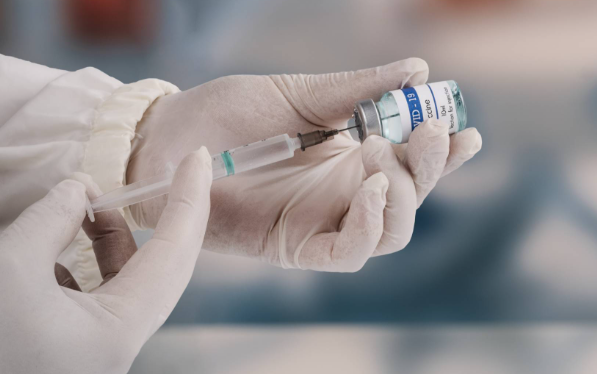Best Free Resources for Traders in 2025: From Charts to AI Alerts
December 01 , 2025

Finding vaccines near you has never been easier thanks to modern digital tools, pharmacy networks, and public health initiatives. From flu shots to COVID-19 boosters, understanding where and how to get vaccinated is crucial for personal health and community protection.
Getting vaccinated remains one of the most effective ways to protect against infectious diseases and safeguard public health. With a wide variety of vaccines available—from seasonal influenza shots to COVID-19 boosters and routine immunizations—finding convenient locations for vaccination is essential. Advances in technology, expanded pharmacy services, and government health programs have made it easier than ever to locate vaccines near you.
Vaccines play a vital role in preventing illness, reducing the spread of disease, and saving lives. Immunizations protect individuals from serious diseases such as measles, influenza, HPV, and COVID-19, while also contributing to community immunity. Access to vaccines ensures that vulnerable populations, including children, the elderly, and immunocompromised individuals, receive the protection they need. Regular vaccination schedules recommended by health authorities provide a framework for long-term health and disease prevention.
Finding vaccines near you is now easier thanks to several tools and resources. Online search engines, government websites, and health apps allow individuals to locate nearby clinics, pharmacies, and medical centers offering vaccinations. Many states and cities provide dedicated vaccine locator websites where users can search by zip code, city, or vaccine type. Additionally, pharmacies like CVS, Walgreens, and Walmart offer online appointment scheduling and walk-in services, simplifying the vaccination process.
Retail pharmacies have become major hubs for vaccinations. They provide accessibility, extended hours, and convenience for individuals with busy schedules. Many pharmacies offer seasonal vaccines, including flu shots, shingles vaccines, and COVID-19 boosters. Staff at these locations are trained to administer vaccines safely and provide guidance on eligibility, side effects, and follow-up doses. Walk-in services are common, and some locations allow online booking to minimize wait times.
Primary care physicians and local health clinics continue to be reliable locations for vaccines. These medical facilities offer personalized guidance, review medical history, and provide a full range of immunizations. Clinics often serve specific populations, such as children, pregnant individuals, or those with chronic conditions. Scheduling an appointment ensures that patients receive vaccines safely and in compliance with recommended protocols. Health clinics also participate in public health programs that provide free or low-cost vaccines to eligible populations.
To reach underserved communities, many public health departments operate mobile vaccination units and pop-up clinics. These services bring vaccines directly to schools, workplaces, community centers, and events. Mobile units are especially helpful for individuals with limited transportation options or those living in rural areas. Pop-up clinics often offer multiple vaccine types in one location, improving accessibility and increasing vaccination rates within the community.
Technology has revolutionized the way people find vaccines near them. Smartphone apps and online platforms provide real-time information about vaccine availability, appointment scheduling, and location directions. Features often include filters for vaccine type, age eligibility, and insurance acceptance. Many healthcare systems now integrate vaccination reminders into their patient portals, sending notifications when doses are due or upcoming vaccination events are available nearby.
When selecting a vaccination site, several factors should be considered. Proximity, availability of appointments, type of vaccine offered, and accessibility for individuals with mobility challenges are key considerations. Insurance acceptance and cost are also important, as some clinics and pharmacies may offer free vaccines under public health initiatives. Safety measures, such as proper storage of vaccines and trained staff, ensure that each vaccination is administered correctly.
Vaccination needs vary across age groups. Children require routine immunizations like MMR, DTaP, and polio vaccines. Adolescents benefit from HPV and meningococcal vaccines. Adults may need boosters for tetanus, shingles, influenza, and COVID-19. Older adults are often recommended to receive pneumonia vaccines. Finding a convenient location ensures that individuals can stay up to date with their recommended immunizations throughout life.
The COVID-19 pandemic has highlighted the importance of timely access to vaccines. Health authorities continue to recommend booster doses to maintain immunity against emerging variants. COVID-19 vaccines are widely available at pharmacies, healthcare centers, mass vaccination sites, and mobile units. Tracking availability through online platforms and health department websites ensures individuals can receive vaccinations safely and efficiently.
Travelers often require vaccines for specific destinations, including yellow fever, typhoid, hepatitis A and B, and meningitis. Travel clinics and certain health departments provide these immunizations, along with guidance on timing, dosage, and documentation. Individuals planning international travel should consult a healthcare provider well in advance to ensure they meet all necessary vaccination requirements.
Access to vaccines near you not only protects individual health but also strengthens community immunity. Widespread vaccination reduces the transmission of contagious diseases, safeguarding vulnerable populations. Schools, workplaces, and public spaces benefit from higher vaccination rates, preventing outbreaks and minimizing disruptions. Public awareness campaigns, combined with convenient access points, encourage communities to maintain high levels of immunization coverage.
Finding vaccines near you has become an essential aspect of modern healthcare. With a variety of options including pharmacies, clinics, mobile units, and online platforms, access to immunizations is more convenient than ever. Staying up to date with vaccinations protects personal health, contributes to community well-being, and prevents the spread of disease. Utilizing technology, understanding eligibility, and planning ahead ensures that everyone can receive the vaccines they need safely and efficiently. Whether for routine immunizations, seasonal boosters, or travel requirements, convenient access to vaccines plays a critical role in maintaining public health and safety.